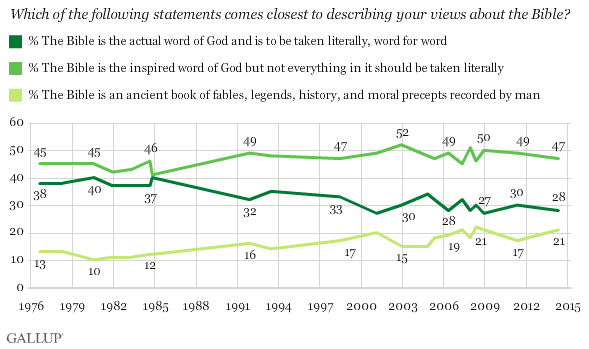
Trends in Biblical Interpretation According to Recent Gallup Poll
According to a recent Gallup poll, 28% of Americans view the Bible as "the actual word of God, to be taken literally, word for word," down 2% from 2012 and almost 10% from the 1970's and early 1980's; yet 75% of all Americans "believe the Bible is in some way connected to God." This number correlates to Gallup's 2013 poll which found that 75% of the American population self-identifies as Protestant, Christian, or Catholic. An increasing number of Americans responded that the Bible "is an ancient book of fables, legends, history, and moral precepts recorded by man:" 21%, up 4% from 2012. This number is at an all-time high, only matched by the same percentage in 2009 over the last 40 years.

Gallup also asked a follow-up question to further examine trends in Biblical interpretation, adding another possible response: "The Bible is the actual word of God, but multiple interpretations are possible." In the second poll with the alternative answer added, the number that said the Bible should be taken literally dropped another 6% to 22%. Other respondents said that the Bible is the word of God, but either multiple interpretations are possible (28%) or everything in it should not be taken literally (28%).
Of the non-Christians included in the poll, the majority (51%) said the Bible is "an ancient book of fables, history, precepts." Twenty-seven percent of non-Christians said that the Bible is the "actual word of God" or "inspired by God."

Implications of the Poll's Results
At first glance, these trends, specifically regarding the decline in Biblical literalism, could be troubling news for the American church. However, is taking the Bible literally, "word for word" necessarily correspond to a trend of decreasing commitment to the Bible?
Pushing Back on the "Literal" Question Itself
Greg Koukl, speaker of Stand to Reason, an organization which aims to "train Christians to think more clearly about their faith and to make an even-handed, incisive, yet gracious defense for classical Christianity and classical Christian values in the public square," would challenge the question itself. In an article on the Stand to Reason website, he says, "When someone asks, Do you take the Bible literally?, I respond by saying that I try to take the Bible with the precision I think the writer intended." He goes on to say, "The question itself creates some confusion."
Glenn T. Stanton, contributor to The Gospel Coalition, also spoke to the issue of literalist interpretation in his article: "Do Faithful Christians Take the Bible Literally?" In it, he says "First, we must understand that the phrase "take the Bible literally" is primarily a litmus test --- a silly one at that --- for "do you really believe the Bible?" This is why so many Christians hold to this truth --- they want to be counted among the Bible-believers. But this is not faithful to God's Word." He goes on to say, "Faithful readers of Scripture know it speaks: literally, poetically, metaphorically, rhetorically, and descriptively."
Looking Elsewhere for Trends
But contrary to what some would have you believe about the church in America, other experts would say that the Church is not dying, but rather experiencing dramatic change. According to Ed Stetzer, President of LifeWay Research Division and contributing editor for Christianity Today, there are four trends worth noting that already exist, but will become increasingly important in the days to come:
1. The Word "Christian" Will Become Less Used and More Clear.
2. The Nominals Will Increasingly become Nones.
3. Christians Will Increasingly Change Cultural Tactics.
4. More Robust Churches will Result from the Death of Nominalism.
Stetzer's take on the implications of these trends for the Church? "They (churches) will either become a cultural church that allows the societal trends to dictate their ever-changing beliefs. Or they will become a counter-cultural church that faithfully adheres to Scripture and proclaims the gospel in a carefully considered way."














